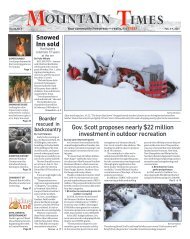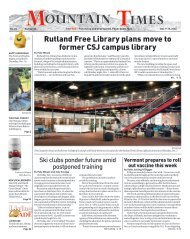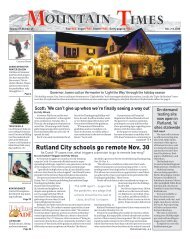Mountain Times - Volume 48, Number 24: June 12-18, 2019
You also want an ePaper? Increase the reach of your titles
YUMPU automatically turns print PDFs into web optimized ePapers that Google loves.
The <strong>Mountain</strong> <strong>Times</strong> • <strong>June</strong> <strong>12</strong>-<strong>18</strong>, <strong>2019</strong> CAPITOL QUOTES • 9<br />
CAPITOL QUOTES<br />
“I’m saddened to hear of the<br />
passing of former state Rep.<br />
David Ainsworth. David was an<br />
exceptional public servant and<br />
showed it in every regard. His<br />
commitment to community, family - and,<br />
of course, his farming - was unmatched. He<br />
will be deeply missed by those who knew<br />
him, and I send my condolences to his<br />
family, friends and colleagues,”<br />
Said Gov. Phil Scott.<br />
On the death of Rep. David Ainsworth<br />
at age 64...<br />
“Rep. Ainsworth leaves a strong<br />
legacy as a fifth generation Vermont<br />
dairy farmer and public servants in<br />
the Royalton and greater Vermont<br />
communities. David was a committed<br />
public servant and will be sorely<br />
missed. My deepest condolences are<br />
extended to his family, his community<br />
and his colleagues,”<br />
Said House Speaker Mitzi Johnson.<br />
“There are a number of people who<br />
come from more urban areas who don’t<br />
understand what farm life is all about,<br />
and David was a really strong voice for<br />
the farmers,”<br />
Said House Agriculture Chair<br />
Carolyn Partridge D-Windham to the Valley<br />
News.<br />
Lynn: Considerations to jumpstart discussion<br />
continued from page 8<br />
For summer fun, let’s put that boast<br />
to the test with a challenge to readers:<br />
study the key issues and propose solutions<br />
to a few of the tougher statewide<br />
and local issues.<br />
Everyone can participate by reading<br />
and contributing ideas through letters<br />
to the editor. Let’s see if we can find<br />
consensus on a measure to present to<br />
our fellow legislators. One idea is to do<br />
this with a couple of friends or neighbors,<br />
as two or three opinions in a room<br />
help focus and fine-tune ideas – and it<br />
brings neighbors and friends together<br />
(and try to avoid arguments, though<br />
that is a natural part of the legislative<br />
process.)<br />
Consider the follow four hot topics:<br />
• Minimum wage and family leave.<br />
Is raising it to $15 by 20<strong>24</strong> the best idea,<br />
or are other options preferable? What<br />
are the pros and cons? Can you leave<br />
it to the free market and still have that<br />
be what’s best for workers and the<br />
economy? On family leave, it should be<br />
a win-win for businesses and workers,<br />
but why is it so hard to find the right mix<br />
of benefit to cost and<br />
what’s the preferred<br />
solution?<br />
• Enacting a Green<br />
New Deal for Vermont.<br />
Could the state get<br />
a jump on a future<br />
job market by being<br />
an early adopter of<br />
greener policies? What<br />
measures are on the table and what<br />
should be pursued in the next session?<br />
• Act 46: Consolidating school district<br />
governance is one thing, consolidating<br />
schools is another. How far should the<br />
state go to force mergers and consolidation?<br />
What can and should small towns<br />
do to resist, if they oppose closing their<br />
school? What’s the best end result for<br />
students?<br />
Here’s a bit of backround and basic<br />
facts on the first topic, minimum wage<br />
and family leave, to get you started as a<br />
basis for informed discussion:<br />
• Vermont’s current minimum wage<br />
is $10.78, with wages going up each year<br />
based on a factor of inflation. Under<br />
Act 176, which was passed in 2014, the<br />
minimum wage rose to $10 an hour for<br />
2017, then to $10.50 on January 1, 20<strong>18</strong>,<br />
and then on the first day of the year<br />
thereafter the minimum wage would<br />
increase by the percentage increase of<br />
the Consumer Price Index with a cap in<br />
case the CPI exceeded 5 percent.<br />
As noted by the conservative-leaning<br />
Ethan Allen Institute, Vermont is currently<br />
tied with Arizona for the sixth<br />
highest minimum wage in the U.S. Other<br />
New England states currently have<br />
the following minimum wages for <strong>2019</strong>:<br />
Massachusetts, $<strong>12</strong> (certain farm workers<br />
will still be pegged at $8 per hour);<br />
Maine, $11; Rhode Island, $10.50; Connecticut,<br />
$10.10. New Hampshire has<br />
no minimum wage, so it defers to the<br />
federal minimum wage of $7.25.<br />
An important note, largely lost in this<br />
year’s hullabaloo over Democrats not<br />
being able to send a minimum wage bill<br />
to Gov. Scott, is that the current bill provides<br />
for an inflationary increase, which<br />
will be about 2 percent. So Vermont’s<br />
current minimum wage of $10.78 will<br />
increase to about $11 on Jan. 1, 2020.<br />
• Among progressive states, much<br />
has been made about a theoretical<br />
“livable wage,” which studies have<br />
pegged around $13.50 or so in Vermont<br />
for <strong>2019</strong>, but which would also rise with<br />
inflation. That’s one of the reasons why<br />
the Legislature picked a $15 minimum<br />
wage for 20<strong>24</strong>; to keep within that “livable<br />
wage” metric. Whether that is right<br />
for Vermont is up for debate.<br />
• The reasons for a rise in the minimum<br />
wage are obvious: $15 an hour<br />
translates to about $30,000 annually<br />
(for easy figuring: 40 hours per week,<br />
times 52 weeks is roughly 2,000 hours<br />
annually, times the rate; $10 per hour,<br />
then, would be $20,000 annually.) Currently,<br />
for a family of four, living on less<br />
than $<strong>24</strong>,000 is below the poverty line.<br />
Also, there’s the theory that a rising tide<br />
AMONG DEMOCRATS AND<br />
PROGRESSIVES THERE WAS BLAME<br />
ALL AROUND, WITH SOME POLITICAL<br />
NOVICES SUGGESTING THEY COULD<br />
DO BETTER.<br />
floats all boats. That is, if we keep the<br />
minimum wage above the poverty line,<br />
or higher, that sector of the economy<br />
pours more money back into the local<br />
economy, which increases business,<br />
etc.; plus subsidies to those families<br />
from some state aid programs would be<br />
reduced.<br />
• The reasons against a higher<br />
minimum wage argue that it would be<br />
an added burden to some businesses,<br />
that some businesses as a result might<br />
reduce hours for those wage earners (to<br />
reduce costs), and that a few businesses<br />
might be forced to close. (Readers<br />
should also note that Vermont exempts<br />
farm workers from the minimum wage<br />
provision.) There are many arguments<br />
around this idea, but it’s primarily that<br />
it would be detrimental to the business<br />
community.<br />
For the family leave issue, the issue<br />
revolves around how generous to make<br />
the program; what’s too burdensome<br />
for businesses; should employees contribute<br />
to the plan; and to what degree,<br />
if any, should the state be involved and<br />
at what ongoing expense?<br />
That should be enough of a start<br />
to foster good discussions. For extra<br />
credit, read Act 176, the state’s current<br />
minimum wage law and read more<br />
about the pros and cons of a higher<br />
minimum wage from qualified sources.<br />
Angelo Lynn is the editor and publisher<br />
of the Addison County Independent,<br />
a sister publication to the <strong>Mountain</strong><br />
<strong>Times</strong>.

















